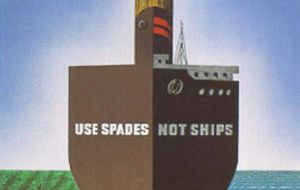MercoPress. South Atlantic News Agency
Can the Falkland Islands achieve economic diversification borne from adversity?
 Original poster from the British war-time campaign “Dig for Victory” (FIDC)
Original poster from the British war-time campaign “Dig for Victory” (FIDC) The launch this month by the Falkland Islands Development Corporation (FIDC) of the Import Substitution Programme under the slogan, “Use Spades, Not Ships” bears striking parallels to the Grow More Food campaign established in war-time Britain during the Second World War. A campaign known better by its slogan – “Dig for Victory”.
“Dig for Victory” was born in 1939. The Second World War was a month old. Harassment of merchant shipping had begun, no-fly zones had been imposed, and Britain was under an economic blockade as Atlantic supply lines were cut. In these dark times the Dig for Victory campaign persuaded people across Britain to take up allotments or turn their gardens and flower beds over to growing vegetables. It was estimated that over 1.4 million people took up growing fruit and vegetables during the war, and even the moat at the Tower of London was given over to allotments.
In 2010, seventy years after the “Dig for Victory” posters first appeared, a self-governing British overseas territory is again being subject to a form of economic blockade with actions against merchant shipping and attempts to disrupt Atlantic supply lines – this time between South America and the Falkland Islands. The Government of Argentina prompted by the resumption of hydrocarbon exploration in the waters surrounding the Falkland Islands has impeded the passage of commercial shipping links which led to the cessation of containerised supplies from South America in June 2011. Such links were heavily relied upon for the importation of fresh produce. Extant threats of future disruption to air-links have further increased the uncertainty of supply.
Both the 1939 “Dig for Victory” campaign and the 2011 “Import Substitution Programme”, initiated by FIDC, recognise the necessity to increase food self-sufficiency to maintain independence and reduce susceptibility to external pressures. However, whilst the former targeted the small-scale home-owner and gardener the latter has identified an opportunity to increase economic diversification and promote rural development in the Falkland Islands.
In a report presented by the General Manager of FIDC, David Waugh, to Executive Council in August 2011 it was highlighted that approximately 319 metric tonnes of fresh fruit and vegetables were imported into the Falklands in 2009/10. Of this total it is estimated that 203 metric tonnes, or 64%, could have been grown in the Falklands, with 75% of the total grown in fields and only 25% reliant on the use of poly-tunnels or greenhouses. In addition 12,000 eggs are estimated to be imported into the Falklands on the LAN flight from Chile every fortnight. The aim is to achieve the import substitution of fresh produce and other products that could be grown or produced domestically, thus increasing self-sufficiency, retaining greater funds within the domestic economy and promoting rural businesses in-line with the Rural Development Strategy.
To these ends £250,000 has been allocated to assist with the cost of increasing the volume of fresh vegetables, fruit and eggs produced in the islands. The funding is available to rural businesses through a system of loans and grants scaled to the applicants own investment and set-up costs. Recognising that lead-in times for establishing or expanding horticultural and poultry operations can be extended the initiative provides for reduced interest rates over the first 2 years and a first year holiday on repayments. The scheme is not aimed at gardeners and hobbyists but is designed to encourage professional business-minded operators that can identify a real opportunity to establish a sizeable and sustainable commercial operation. As a result, only proposals with a total investment of £10,000 or over, including applicant investment capital and FIDC loan and grant components, will be eligible for consideration.
The ultimate aim is for the Falklands to become more self-sufficient and less susceptible to external pressure with regards to food imports.
So it remains to be seen whether the restriction of shipping links to the Falklands can be turned to advantage and used to foster increased economic diversification. However, to the stoic British character of the islanders such antagonistic actions merely increase resolve, the British “stiff upper lip” so famous in times of adversity is not a medical symptom of scurvy.
By Grant Munro – SeAledPR - Stanley




Top Comments
Disclaimer & comment rules-

-

-

Read all comments“........to the stoic British character of the islanders such antagonistic actions merely increase resolve, the British “stiff upper lip” so famous in times of adversity ..........”
Oct 26th, 2011 - 03:43 pm 0Ohh boy, ohhhhhhhh boy........
You will get ample opportrunities to exercise that “Famous British Stiff Upper Lip” in the next many years, my dear British Squatters and Squatterettes...........
Once the oil starts flowing the islanders will be able to afford Argentines dressed as butlers to deliver each meal straight to their door.
Oct 26th, 2011 - 03:50 pm 0@1
Oct 26th, 2011 - 03:52 pm 0What a Dick :-))))))
Commenting for this story is now closed.
If you have a Facebook account, become a fan and comment on our Facebook Page!